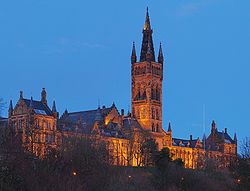- Chair of Celtic, Glasgow
-
Chair of Celtic
University of GlasgowEstablished 1956 Founder James Crawford Inaugural holder Angus Matheson Notable holders Derick Thomson Website www.gla.ac.uk/celtic The Chair of Celtic is a professorship at the University of Glasgow, established in 1956 by an endowment from merchant James Crawford, the Ross Trust and the University's Ossianic Society.[1]
Contents
History
In 1942, dyestuff and chemical merchant James Crawford died, leaving a portion of his estate to the University to found a Chair in Celtic language and literature. The Chair was established in 1956 using these funds as well as contributions from the University's Ossianic Society and the Ross Trust.[1] The first professor, Angus Matheson, was appointed that year. Matheson, formerly Senior Lecturer in Celtic at the University, remained in post until his death in 1962.[2]
In 1963, Derick Thomson was appointed to the Chair. Thomson, also known under his Gaelic name, Ruaraidh MacThòmais, had been Lecturer in Welsh at the University from 1949 until 1956, when he became Head of the Department of Celtic at the University of Aberdeen.[3] He was editor of Scottish Gaelic Studies, a journal produced by the Aberdonian department,[4] founded Gairm, a quarterly Gaelic magazine which ran for over fifty years under his editorship, and continues to write extensive poetry. He was awarded an honorary degree of Doctor of Letters by the University in 2007. When Thomson retired in 1991, he was succeeded by a fellow Aberdeen academic, Donald MacAulay, who had succeeded Thomson as editor of Scottish Gaelic Studies in 1978.[4] MacAulay took over the Chair in 1991, remaining at the University until 1995.[1]
In 1995, Cathair O'Dochartaigh was appointed to the Chair, succeeded in 2005 by American academic Thomas Owen Clancy.[1] Clancy studied at New York University, and received a Ph.D. from the University of Edinburgh, and now specialises in Dark Age Celtic literature.[5] In 2001, he put forward a theory that St. Ninian, an eighth century missionary among the Pictish peoples of what is now Scotland, was in fact a Northumbrian spin-off of St Finnian, the British missionary to whom St. Columba was a disciple. He argued that the confusion is due to an eighth century scribal spelling error, for which the similarities of "u" and "n" in the Insular script of the period were responsible.
The Chair of Celtic is based within the Department of Celtic and Gaelic, part of the School of Humanities in the College of Arts.
Professors of Celtic
- 2005 - Thomas Clancy
- 1995 - Cathair O'Dochartaigh
- 1991 - Donald Macaulay
- 1963 - Derick Thomson
- 1956 - Angus Matheson
See also
Notes
- ^ a b c d "Chair of Celtic". University of Glasgow. 10 April 2008. http://www.universitystory.gla.ac.uk/chair-and-lectureship/?id=124. Retrieved 20 August 2010.
- ^ "Angus Matheson". University of Glasgow. 8 August 2008. http://www.universitystory.gla.ac.uk/biography/?id=WH0904&type=P. Retrieved 20 August 2010.
- ^ "Derick Thomson". University of Glasgow. 5 May 2010. http://www.universitystory.gla.ac.uk/biography/?id=WH2165&type=P. Retrieved 20 August 2010.
- ^ a b "Scottish Gaelic Studies journal". University of Aberdeen. http://www.abdn.ac.uk/celtic/pubs.hti. Retrieved 20 August 2010.
- ^ "Thomas Clancy". University of Glasgow. http://www.gla.ac.uk/departments/celtic/ourstaff/profthomasclancy/. Retrieved 20 August 2010.
External links

History Bishop Turnbull · Queen Margaret College · Academic dress · Parliamentary Constituency · Lion and Unicorn Staircase · Memorial Gates · List of University of Glasgow people · List of Professorships · Snell ExhibitionDepartments Dental School · Glasgow Cardiovascular Research Centre · Humanities Advanced Technology and Information Institute · School of Law · Medical School · Robertson Centre for Biostatistics · Trinity College · Vet SchoolFacilities Students BodiesStudents' Representative Council · Glasgow University Sports Association · Glasgow University Union · Queen Margaret UnionClubs &
SocietiesBoat Club · Conservative Association · Dialectic Society · Labour Club · Medico-Chirurgical Society · Rugby Football Club · Scottish Nationalist Association · Glasgow University Royal Naval Unit · Glasgow and Strathclyde Universities Officer Training Corps · Universities of Glasgow and Strathclyde Air SquadronMediaCategories:- Glasgow Professorships
- 1956 establishments in Scotland
- Professorships in Languages
- Celtic studies
Wikimedia Foundation. 2010.

